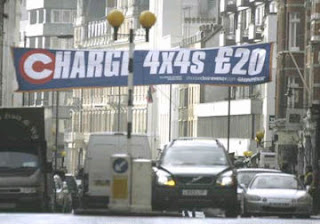Recent polling shows that two thirds of Londoners support proposals to charge cars with the highest greenhouse gas emissions £25 a day to drive in the central London congestion charge zone and introduce a zero charge for the lowest emitting vehicles.
The results, announced late December by Ken Livingstone, Mayor of London, come from polling carried out by Ipsos Mori as part of the recent consultation on the emissions based charging proposals. The survey was based on a very large survey of 3,620 Londoners, with around half of those resident in the existing congestion charging zone.
The survey found:
o 91 per cent of those questioned said that they thought climate change was "important" or "very important"
o Two-thirds (66 per cent) of respondents were in favour of the proposal upon which Transport for London has consulted, with 38 per cent strongly supporting it. Only 21per cent opposed the scheme.
o 63 per cent of respondents stated that the higher charge would act as an incentive to use a lower CO2 emitting car.
o Over two-thirds (68 per cent) of respondents believed that the proposals as consulted upon would benefit London, of which 32 per cent strongly agreed. Only 17 per cent disagreed with this.
The proposals consulted upon would see drivers of cars which make the biggest contribution to global warming, those in Vehicle Excise Duty Band 'G' and equivalent, such as some of the so-called 'Chelsea tractors', some high powered sports cars and expensive luxury vehicles, pay £25 a day to drive in the existing central London congestion charge zone.
The great majority of drivers within the zone would be unaffected, and would continue to pay the standard £8 charge.
The polling was commissioned as part of Transport for London's consultation on emissions based charging proposals.
Mayor of London, Ken Livingstone said: "These results show that the vast majority of Londoners support action to tackle climate change. The proposals consulted upon are part of a package of measures London is taking to lead the way in averting catastrophic climate change.”





